Story by Wayne Gillam, UW ECE News | Photos and captions by Paula Bock, Mobilizing Myanmar
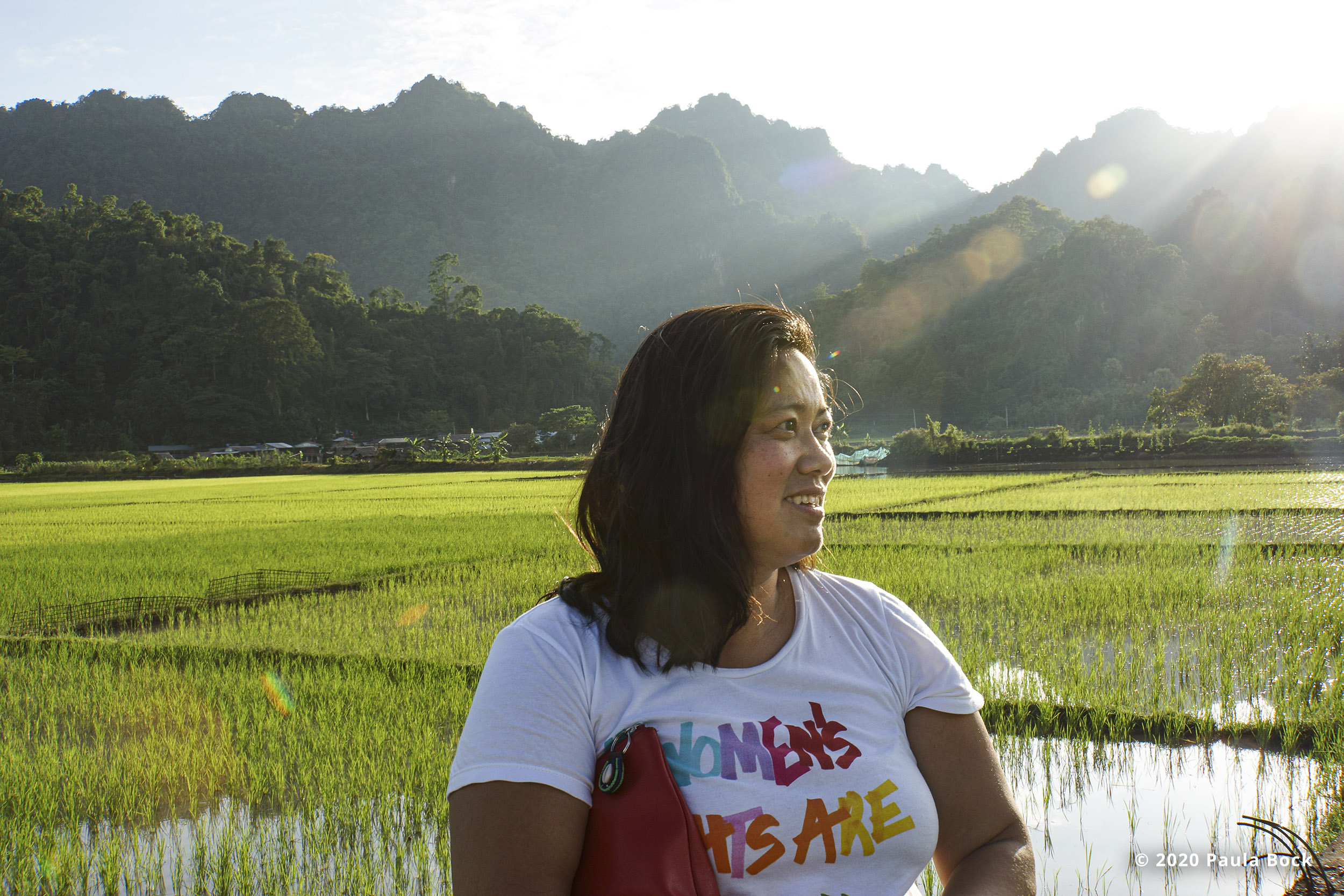
Pwint Htun (’97), co-founder, Mobilizing Myanmar
Update: This story was first published online in early January 2021, a few weeks prior to the military coup that took place in Myanmar. Pwint Htun (BSEE ’97) has spent several years leveraging digital technology and using problem-solving skills she gained at UW ECE to assist the rural population of her native country. In regard to current events in Myanmar she stated, “I just feel grateful that we were able to get smartphones and connectivity into everyone’s hands during this brief opening of the country [prior to the coup]. I am cautiously hopeful that our work on telecommunications liberalization and digital finance will survive this.” Learn more about Htun’s work in Myanmar through her organization’s website, Mobilizing Myanmar.
Myanmar, a country in Southeast Asia sandwiched between Bangladesh, India, China and Thailand, is one of the least developed nations on earth. It has poorly maintained roads and a weak electrical grid that is inaccessible to most people in rural areas. So, it can come as quite a surprise to learn that despite its lack of development, almost everyone in this country owns or has easy access to a low-cost, fast and reliable smartphone.
This is in large part thanks to Pwint Htun, a former refugee from Myanmar who received her undergraduate degree in electrical engineering from UW ECE (then UW EE) in 1997. After graduation, Htun went on to a successful telecommunications career, working for companies such as Hewlett-Packard, Clearwire and T-Mobile, where she was part of a team that contributed to development of the first Android smartphone.
Over the past eight years, she has focused her formidable talents and energy on solving a complex and difficult problem in her native country of Myanmar — how to connect the large, rural population to the rest of the world in order to empower people economically and ensure they don’t get left behind.
“In my four years at the UW, there was a lot of focus on problem-solving, learning to ask the right questions to solve problems, and that is what has been really helpful for me,” Htun said. “The problems that I solve now are different than they were before, but it’s still the same methodology — tackling what may seem like a big problem and then chunking it into small pieces, figuring out ‘who, what, when, how,’ and then making small progress to achieve the larger goal.”
“The most important thing to know about technology is that it is a great tool, and a great enabler to reduce inequalities.” — Pwint Htun
By working closely with Myanmar’s Ministry of Communications and Central Bank, and partners such as the Gates Foundation, Htun led an effort to make smartphone connectivity and financial services more accessible and affordable for everyone in the nation. She has made major strides in digitally connecting the country over the last eight years, drafting regulations for the mobile financial services industry and significantly improving Myanmar’s telecommunications landscape.
Eight years ago, Myanmar was the third least-connected country on the planet. Today, Myanmar has a smartphone penetration rate of 114%, which means there are more smartphones than people in the country. This is a higher mobile penetration rate than in either the U.S. or Germany, and the phones are speedy — over 94% of the population has 3G or 4G coverage. Also, over 64,000 mobile financial service providers across the country called “mobile money agents” — individuals who own small shops in cities, towns and villages across Myanmar and function like human ATMs — help to provide digital financial services to their communities. The country has seen digital financial transactions increase approximately 800% in the last year.
“The most important thing to know about technology is that it is a great tool, and a great enabler to reduce inequalities,” Htun said. “If we choose to focus on altruistic uses of the technology, there is a huge potential to bring about change.”
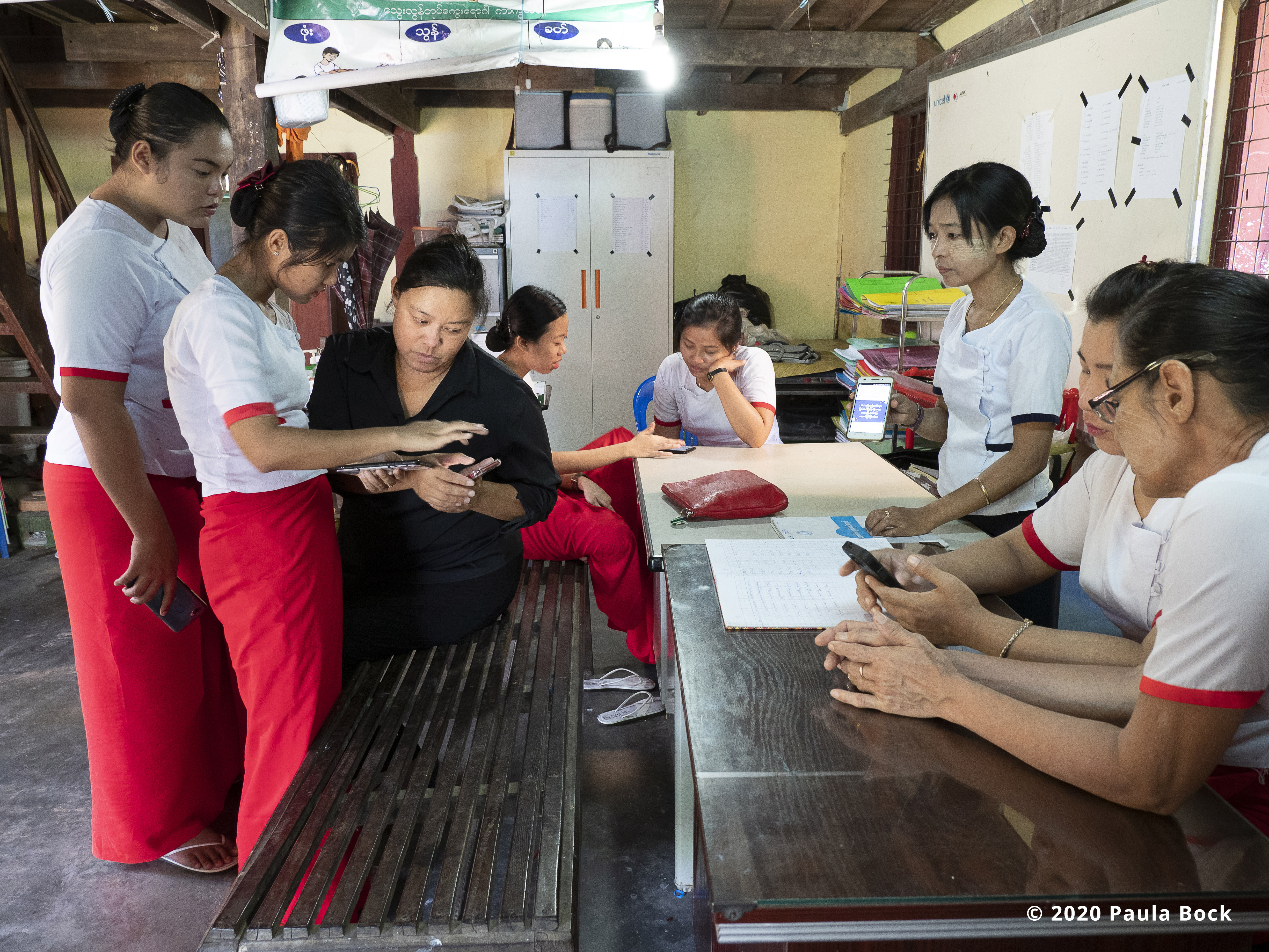
In a rural village in Myanmar’s Ayeyarwady Delta, Pwint Htun teaches midwives to download apps, part of a multisector project to improve nutrition for pregnant women in a region with the nation’s highest connectivity — and also the highest rate of child stunting.
Benefits and unexpected impacts of smartphones
Ease of access to smartphones and digital financial services are bringing sweeping changes and far-reaching benefits to the people of Myanmar, especially the rural population. Digital technology has made economic opportunities within the country more accessible to those in rural areas, and it enables people to connect with friends and family both inside and outside the country anywhere, anytime.
The ability to send and receive money electronically helps to create a financial safety net for people in Myanmar as well, enabling those in urban areas to send money to loved ones in rural villages and vice versa. Access to digital financial services also reduces the need to carry large amounts of cash, which has enhanced physical safety for many people, such as women and migrant workers who are more vulnerable to physical attacks and robbery.
“In Myanmar, there are many domestic migrant workers, as well as international migrant workers,” Htun said. “If you’re a migrant worker, you don’t have access to a bank account, because banks are only open from 10 a.m. to 3 p.m. You’re going to be at work then, and your salary is paid out in cash. So, what do you do? You just carry the money on your body.”
With easily accessible mobile money agents all across the country, people can now digitize their cash at almost any time of day, and even receive digital payments instead of cash, which helps to provide some much-needed financial security. The government is also working on digitizing its payments to citizens, which will help to further enhance this social safety net.
“In the future, it’s not going to be the developed world versus the developing world, it’s going to be the digitized world versus the unconnected world. I hope that people in Myanmar become fully a part of the digitized world. They have the perfect ingredients, they just need to take that next step.” — Pwint Htun
Htun is also focused on fostering economic empowerment for women, who have been shown in many societies, including Myanmar, to spread wealth throughout communities more rapidly and effectively than men. This has a stabilizing effect on the culture at-large. According to studies cited by Htun, this is because women spend, on average, 90 percent of their earned income on their families — food, education and health care — while men spend only 30–40 percent of their income on family and the community.
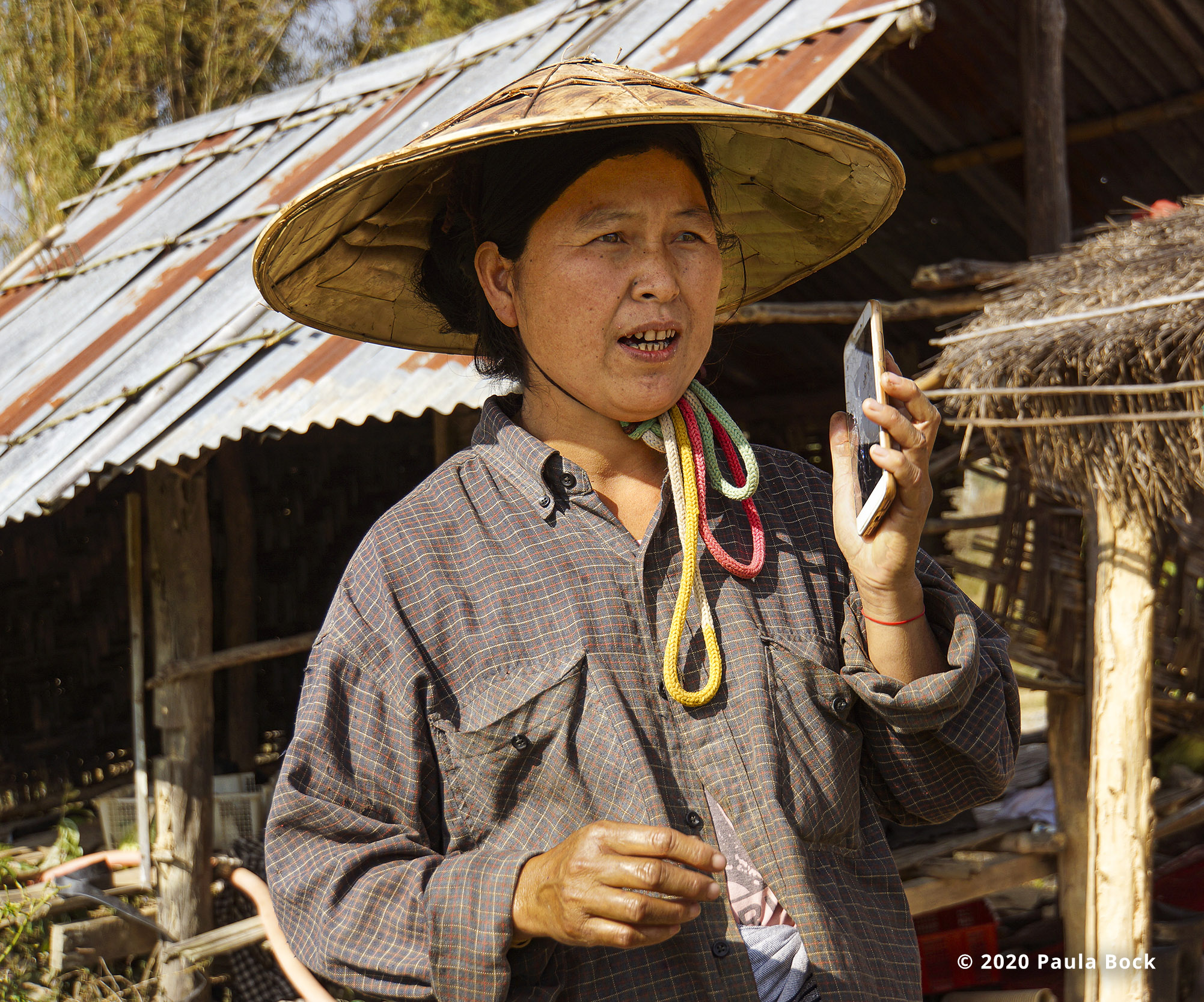
In rural Shan state, a strawberry farmer uses Facebook Messenger to inform a buyer of how much produce she shipped to him; he pays her digitally. Because she had to quit school in the fourth grade, the farmer wants her daughters to get a good education. Her oldest daughter, who attends a distance-learning college, taught her mom to use mobile money.
“It’s a very big, ambitious goal to tackle — to shift more resources into women’s hands,” Htun said. “When we considered women in Myanmar’s rural areas, we realized that the best way to get them to become more economically empowered is to get them to become more digitally literate, digitally savvy, so that the phone that is already in their hands can become a tool for them to earn more income.”
There have been a couple other significant benefits of this technology that were unexpected and unplanned by either Htun or the Myanmar government. One was nudged into existence in large part by the novel coronavirus (COVID-19), which has had the effect of putting Myanmar’s move toward smartphones and digital financial services on fast-forward.
“COVID-19 has accelerated digital adoption around the country. What we told people was possible, COVID-19 is forcing them to do. For example, if you’re a blind person in Myanmar, usually the only type of paid work available to you is working as a massage therapist. COVID-19 shut these businesses down, and there is no unemployment system in Myanmar,” Htun explained. “But I taught three blind people how to use mobile money, and it has spread like wildfire. They have taught each other, and hundreds of blind people in Myanmar now have opened a digital wallet, which allows them to receive money from friends, family and those who want to help. So, it’s really benefiting the blind population.”
The other unexpected benefit has been a rapid adoption of solar power.
“The majority of people in Myanmar don’t have access to grid electricity. As of this year, only 50% of the population has access. But what has happened is that people want to be connected to their loved ones, so they buy smartphones,” Htun said. “They have to figure out a way to charge the phones off the grid, so many people end up investing in inexpensive solar panels. It’s the positive externality of telecommunication liberalization in Myanmar, where people in their desire to connect digitally decide that they need to have access to solar panels and prioritized that.”
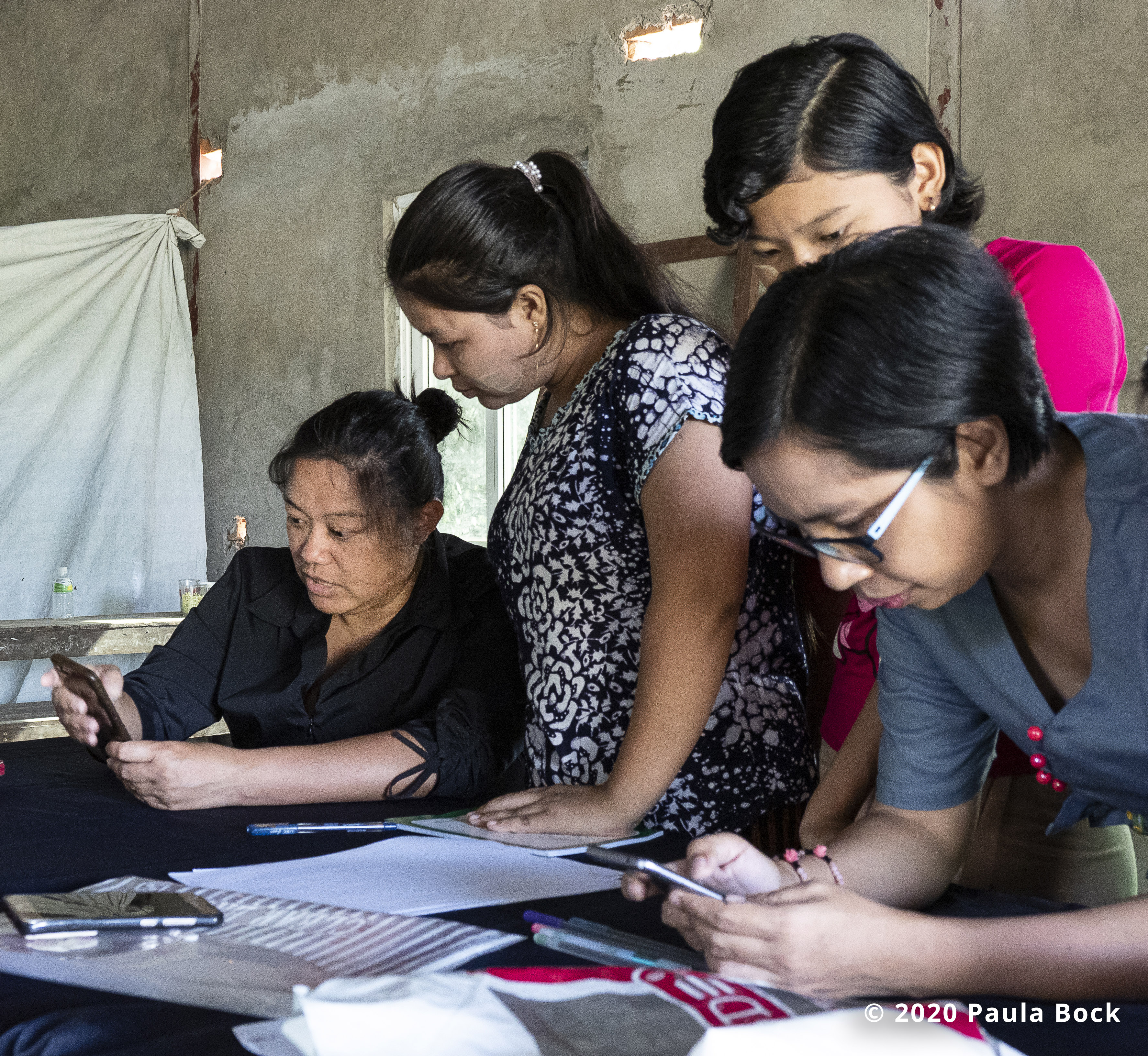
Htun instructs trainers from grassroots women’s organizations who will then teach digital literacy and livelihood skills to other village women. This sustainable approach empowers women to continue learning from each other as technology evolves.
Teaching digital literacy and moving into a connected world
Of course, not every unexpected impact from Myanmar’s leap into digital technology has been positive. Like many other societies around the world, the country has suffered from the spread of disinformation, which proliferates more rapidly online. Fake news (such as a popular rumor in Myanmar that onions can cure COVID-19) and hate groups can also be empowered by technology, so Htun is actively working to implement digital literacy education.
“Technology is a tool, and like any other tool, it is a double-edged sword,” Htun said. “The most important thing is to teach people positive ways of using technology, so it can overwhelm negative uses of technology. I work a lot on digital literacy for that reason.”
Next steps for Htun include continuing to expand Myanmar’s network of female mobile money agents, implementing quick-response (QR) codes across the country to ensure accessibility, ease and speed of financial transactions, and encouraging the government to digitize all payments and bureaucratic, paperwork-driven processes to reduce friction, corruption and better serve the people of Myanmar.
“In the future, it’s not going to be the developed world versus the developing world, it’s going to be the digitized world versus the unconnected world. I hope that people in Myanmar become fully a part of the digitized world. They have the perfect ingredients, they just need to take that next step.”
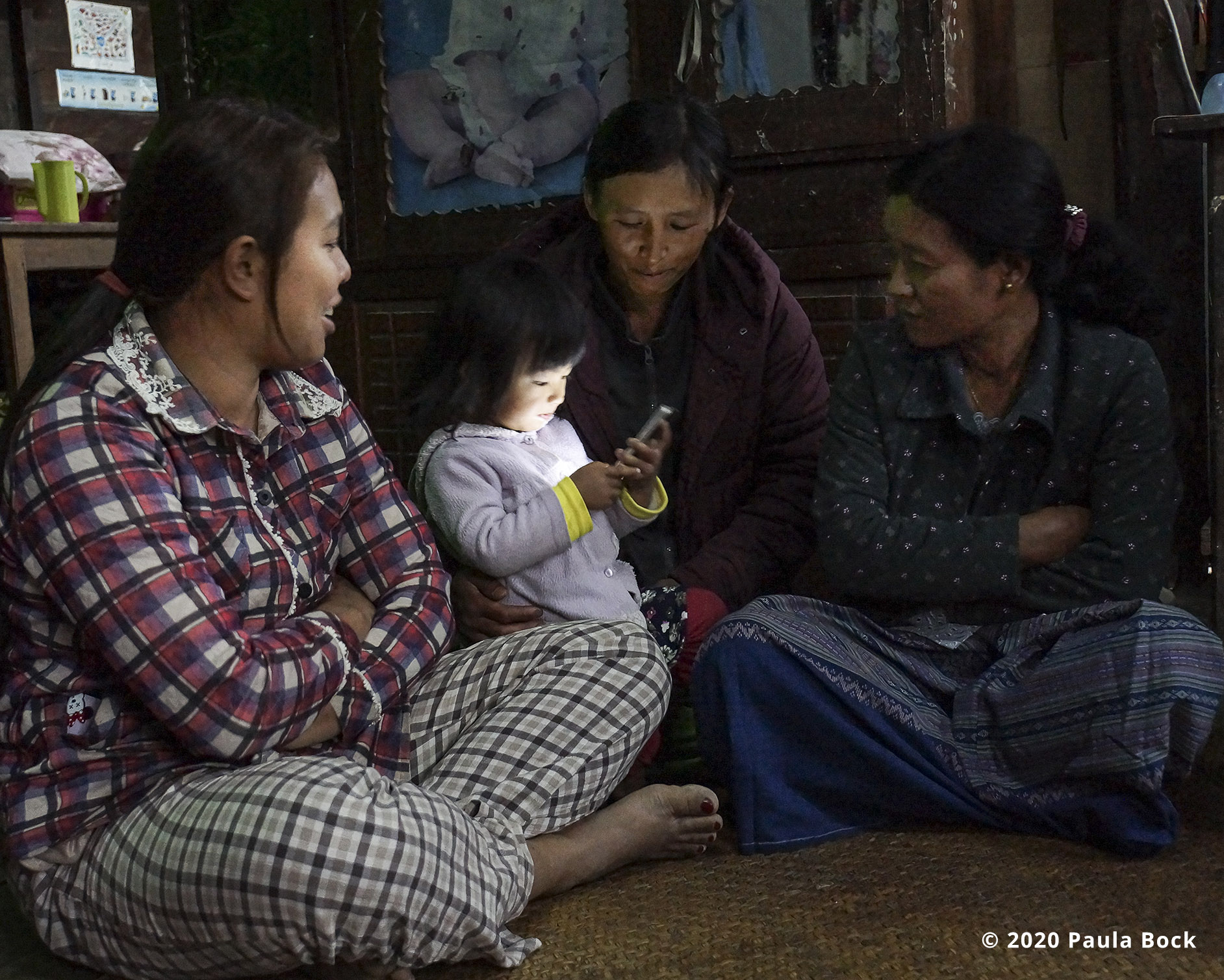
Life in remote northern Chin state is like stepping back a century in time — except for the smartphone in the toddler hands of the next generation. In a nation where 38 percent of the population lives below the global poverty line, mobile money can transform society as women safely earn and save money, network with each other, escape poverty and gain power.
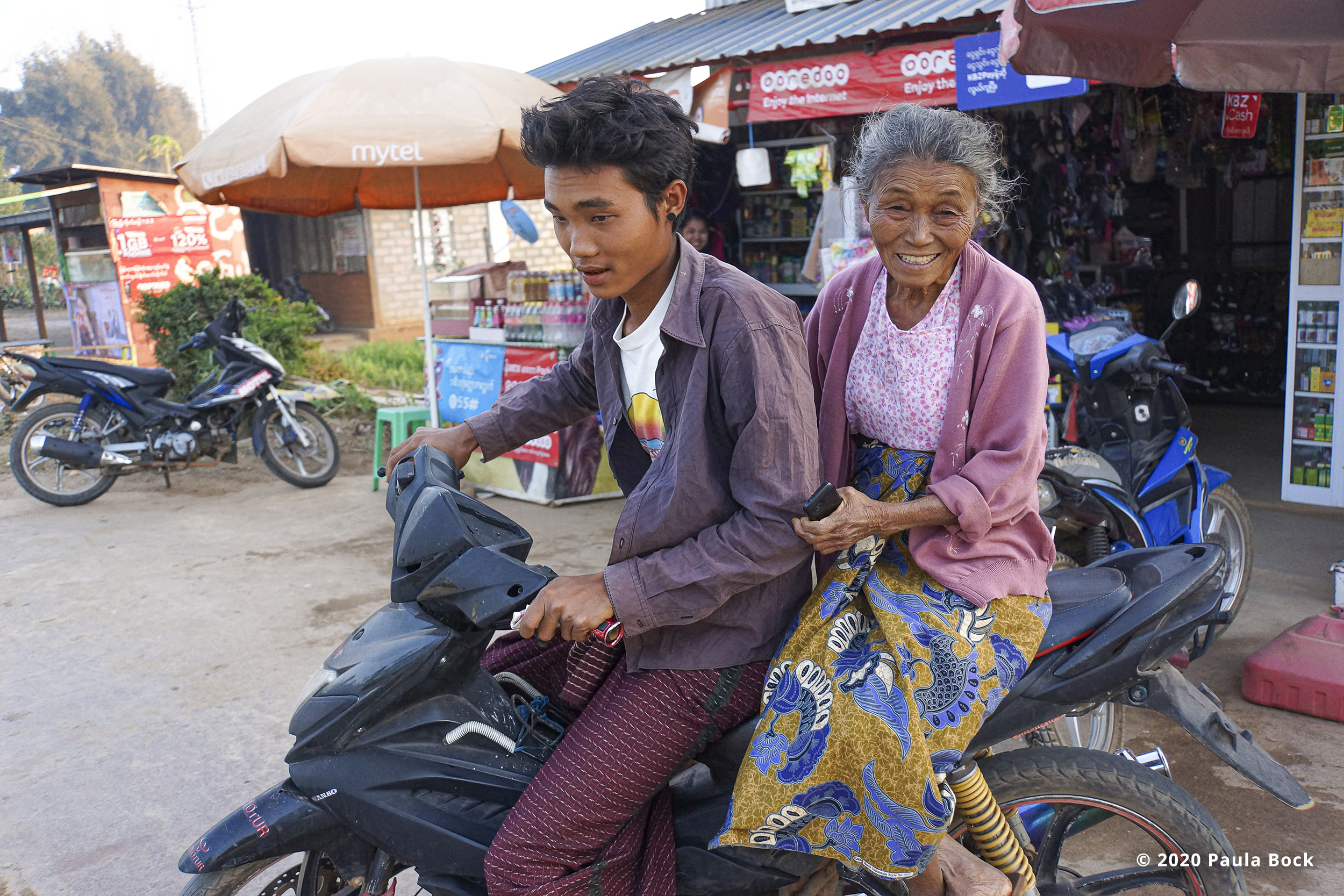
After using her digital wallet to get cash from a mobile money agent at a roadside stall, this grandma wheels around on the dusty roads of northern Shan State, phone in hand. Because Myanmar has extensive network coverage and pervasive smartphone usage (even among the poor), it’s an ideal place to test innovations and demonstrate how unbanked women can empower themselves using digital tools.

